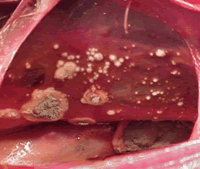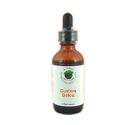 Arthropod/Vector
Bacteria
Chemicals
Fungus /Mold
/ Yeast Metals Parasites Virus Other Arthropod/Vector
Bacteria
Chemicals
Fungus /Mold
/ Yeast Metals Parasites Virus Other
|
Aspergillus
Most people are naturally immune and do not develop disease caused by Aspergillus. However, when disease does occur, it takes several forms. The type of diseases caused by Aspergillus are varied, ranging from an "allergy"-type illness to life-threatening generalized infections. Diseases caused by Aspergillus are called aspergillosis. The severity of aspergillosis is determined by various factors but one of the most important is the state of the immune system of the person, and health of the lungs. Aspergillus can cause a broad spectrum of disease in the human host, ranging from hypersensitivity reactions to direct angioinvasion (invaded blood or lymph vessels). Aspergillus primarily affects the lungs causing 4 main syndromes which include: allergic bronchopulmonary Aspergillosis (ABPA), chronic necrotizing Aspergillus pneumonia (or chronic necrotizing pulmonary aspergillosis [CNPA]), aspergilloma (a fungus ball [mycetoma] that develops in a preexisting cavity in the lung parenchyma) and invasive aspergillosis infection in many organs of the body. Aspergillus is second to Candida species as a cause of fungal endocarditis. Aspergillus -related endocarditis and wound infections occur in the context of cardiac surgery. Sources of increased risk include: dirty air conditioning units, old books, compost heaps and damp or flood-damaged housing. All of these can yield very high numbers of aspergillus spores. NOTE: If you suspect you have been exposed to this fungus, it is fair to assume you have been exposed to some Mycotoxins produced by this fungus and you likely need to add the (Mycotoxin) remedy to your cart as well. |
|



